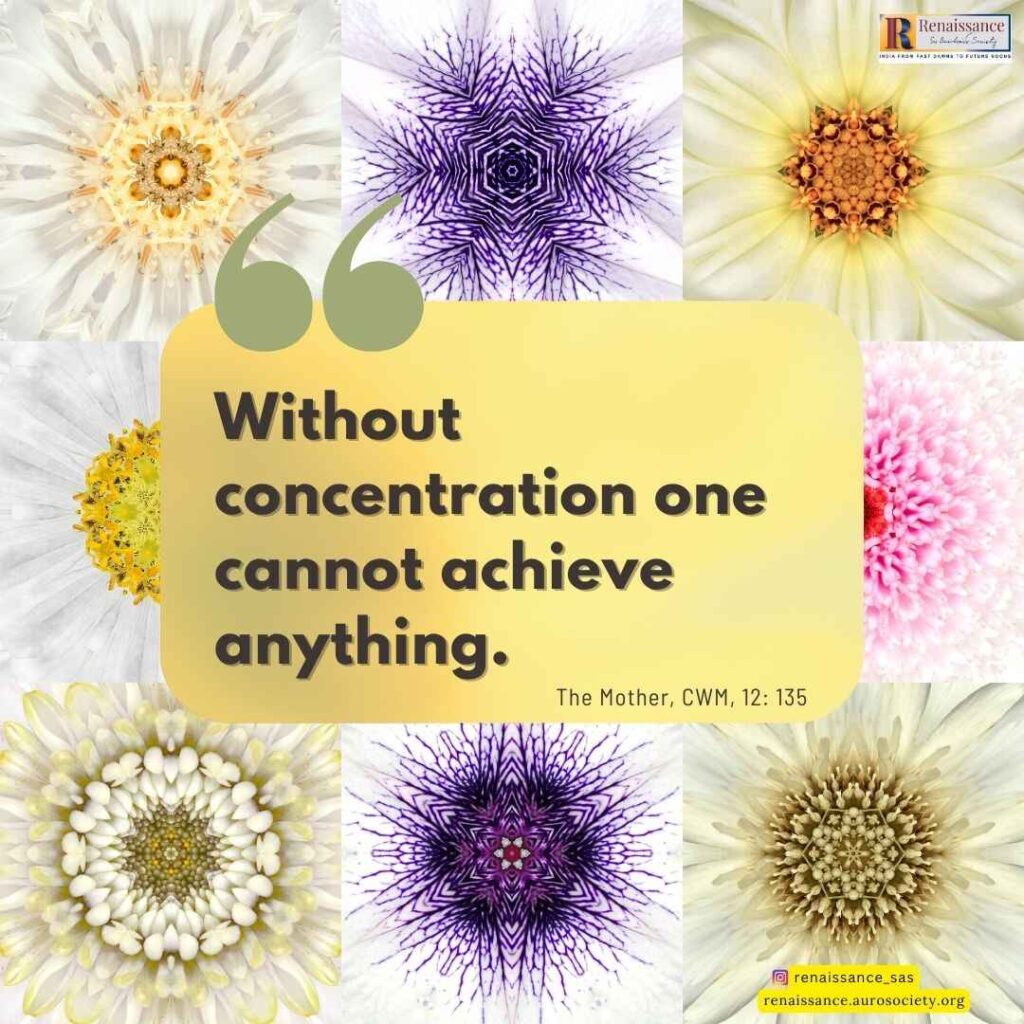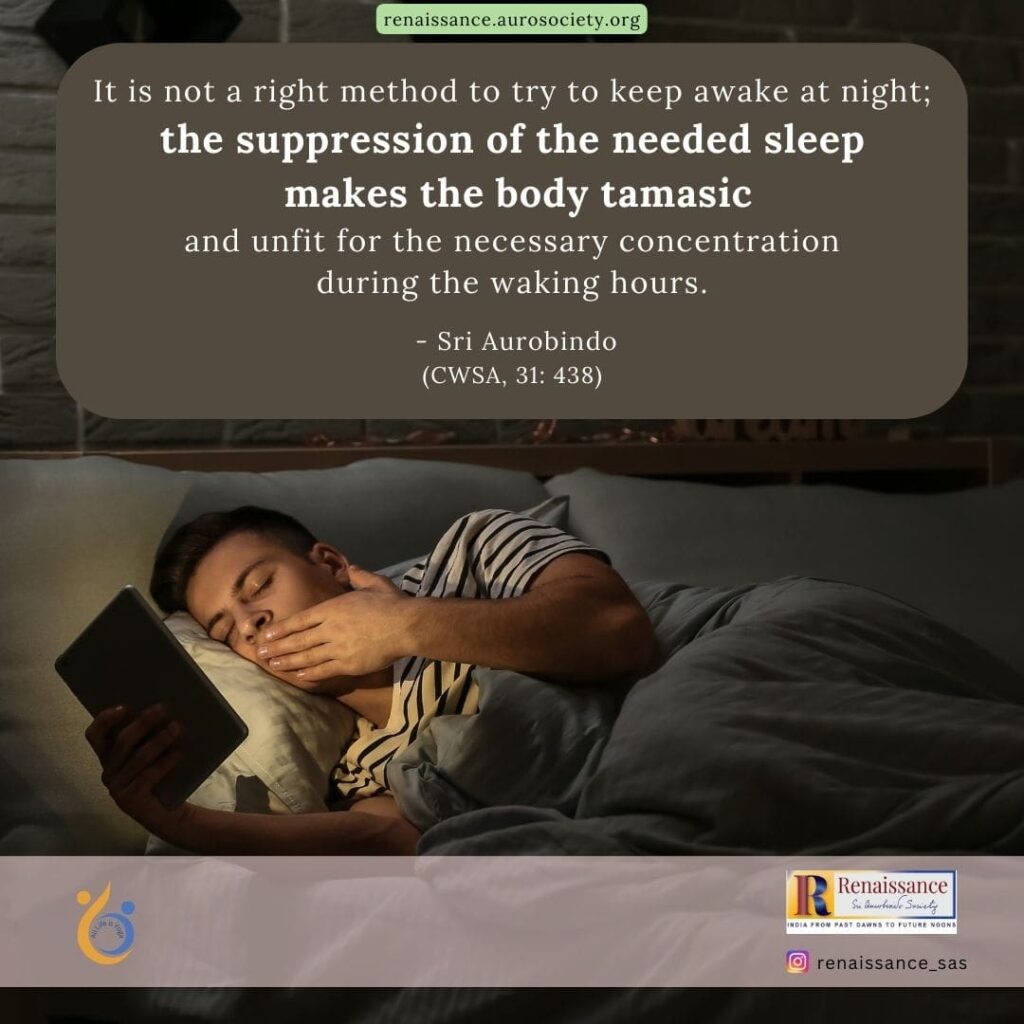Editor’s note: In order to explore the problem of Concentration and Focus from a scientific point of view, Narendra Murty, Renaissance contributor and core team member, spoke to Chirasree Mitra. Ms. Mitra has a long experience of working as a psycho-social counsellor and shares some important insights based on her observations and interactions with clients and her general observations as a health professional.
***
Renaissance in Conversation with Chirasree Mitra
Narendra: What is the importance of Concentration and Focus for our effective functioning in the world?
Chirasree: In today’s fast-paced world and considering the multiple demands that life makes from each of us, we are all under pressure to deliver. Regardless of our age or gender, we all have certain responsibilities to fulfil and certain tasks that we must take care of. Even to satisfy our basic needs, we must work at a certain level of performance; and any kind of performance or activity is directly related to these two concepts of Focus and Concentration.
Without concentration one cannot achieve anything.
~ The Mother, CWM, Vol. 12, p. 135
Narendra: Can you explain in simple terms the difference between Concentration and Focus? Are they actually different or do they mean the same thing?
Chirasree: Concentration is our ability to be attentive on the task at hand while ignoring distractions or simply directing all our efforts onto one particular thing and not thinking about anything else at that given point of time. We can speak of three stages of concentration – light, moderate and deep. To achieve the deepest level of concentration, we require significant amount of time and effort. A good level of concentration helps us improve our performance whatever the task may be and results in more satisfaction with the outcome.
Narendra: And Focus?
Chirasree: Focus is the point of concentration. When we prioritize something that needs to be done we are actually locking our focus. We can also define it as the starting point for concentration. Once we are focused on something we start concentrating and the target then becomes to complete that task. The level of our concentration will then determine the outcome of that task.
Although concentration and focus may seem very similar we need to understand the subtle difference.
A purpose gives you the focus and concentration gives you the ability. Therefore, to get something done or to get complete satisfaction out of something we need both focus and concentration.
Narendra: Which part of our brain is responsible for our focus and concentration?
Chirasree: The prefrontal cortex (PFC) of our brain is largely associated with the functions of memory, intelligence, concentration, temper and personality. This area of our brain is responsible for our cognitive behaviour and executive functions such as concentration, organization, reasoning, creativity, decision making, rational abilities and regulation of emotions. It is located in the cerebral cortex covering the front part of the frontal lobe, right behind the eyes and the forehead.
***

Narendra: Does our physiology or physical constitution have a role to play in our ability to focus and concentrate? In other words, does the body in some way affect the mind and its ability to focus and concentrate?
Chirasree: Yes, according to medical science, there are some hormones and neurotransmitters in our brains that affect our levels of concentration and focus.
Hormones are secreted by our endocrine system or certain glands. Neurotransmitters, on the other hand, are produced by our nervous system. They are both chemicals and carry messages from one part of the body to another thereby having control over various physical and psychological functions of our body.
Primarily there are two kinds of chemicals, one that excite or stimulate the brain and the other that have a more calming effect. Eventually, however, they all they affect our functions of focusing and concentration, directly or indirectly.
- Oestrogen – Lower levels of oestrogen can affect our ability to think and this may affect our levels of concentration. Menopause leads to changes in the level of this hormone.
- Melatonin – Lower levels of melatonin leads to lack of sleep.
- Dopamine – This is also known as the happy hormone. When we are happy or in a state of well-being, we feel motivated, if the motivation is high then focus comes and it is easier to concentrate. Similarly, if our dopamine levels are low then it affects our attention level. Low dopamine levels result in concentration problems as well as sleep related problems.
- Adrenaline – It is known to help us with sharpness, focus and concentration. But too much of this stuff, and in a continuous high dose, can result in too much excitement and stress that will become a barrier to achieve focus and gain good level of concentration.
- Norepinephrine – This increases alertness, arousal and attention leading to better focus and concentration.
- Serotonin –Normal serotoninlevels in our body help us to feel more focused, happier, emotionally stable and calmer. This kind of mental disposition will subsequently lead to good levels of concentration.
Also read:
How to cultivate greater concentration and focus
Narendra: What other factors apart from physiological constitution can cause lack of focus and concentration?
Chirasree: There can be a whole lot of factors contributing to our lack of focus and concentration. Let us list a few:
Physical exhaustion – multitasking very commonly ends up in making us feel extremely tired both mentally and physically. The demands of modern life often lead to lack of adequate sleep. Along with further exhaustion this results in lack of energy and lack of motivation.
Too much going on in life – juggling with too many things at a time creates difficulties with decision making. It prevents us from thinking clearly and we end up making careless mistakes. It also leads to forgetfulness and diffculties with memorizing.
Chronic stress and anxiety – can cause cognitive impairment, which basically means having an impaired ability to think and function. When we are highly stressed it results in poor concentration and poor memory. Our brain is too worked up to focus. Trying to get something done in such situation is very difficult. This unproductiveness can lead to more stress which then causes distraction and further stress. Thereby landing us in a vicious circle of stress and anxiety.
Depression – feeling sad and emotionally down can lower our focus and hence it becomes more difficult to concentrate. It is also linked to forgetfulness and confusion. Psychomotor retardation, commonly seen in severe cases of depression, is slowing down of the mental and physical activities. In simple words, it means slow thinking and slow body movements.
LIFESTYLE ISSUES: There can be several such issues:
- Too much of alcohol – substance dependence leads to disorganized thoughts and confusion making it difficult to focus on something. Regular intake of alcohol effects our memory and continuation of alcohol abuse makes our memory and concentration progressively worse.
- Lack of healthy or balanced diet – lack of certain nutrients in the body can lead to brain fog. Certain foods such as nuts, leafy vegetables, green tea, berries, foods that are rich in omega 3 fatty acids such as fish, eggs which help the body produce serotonin, and even coffee when taken in moderation can help with reducing fatigue, managing stress and boosting overall brain health.
- Lack of regular exercise and physical fitness – physical activities boost the blood circulation to our brain and also enhance the levels of chemicals like dopamine, norepinephrine and serotonin thereby enabling us to focus and concentrate better. Exercise also releases endorphins which help us to feel happy and relaxed.
- Not enough sleep – our brain needs adequate amount of rest for rejuvenation and proper functioning.
Environment – physical discomfort, too much noise, cluttered surroundings etc. can be a major cause for distraction.
***

Then there is another major issue of excessive screen time.
The light from the screen mimics daytime and suppresses the melatonin secretion. Melatonin helps us to sleep. Even small amount of screen time before we go to bed can delay melatonin release and desynchronize the body clock.
Screen time usage for activities such as gaming releases so much dopamine that overuse of this can lead to desensitization of the brain’s reward system. Henceforth the brain will require more and more stimulation for the release of dopamine and less of dopamine will adversely affect focus and motivation.
Excessive screen time also causes hyper arousal which suppresses the frontal lobe. Now that is the brain’s area which is responsible for the executive functions such as concentration. More screen time also means less of ‘green time.’ In other words, the more time we spend with electronic gadgets the less time we spend interacting with nature. Outdoor activities and interaction with nature reduce stress and improve attention.
Medical conditions – Apart from what I have already mentioned, certain other medical conditions can cause difficulty in concentration and focus, like ADHD (Attention Deficit Hyperactivity Disorder), Dementia, TBI (Traumatic Brain Injury), migraine, insomnia etc.
Narendra: Based on your experience with different clients, what lifestyle changes would you suggest to improve our focus and concentration?
Chirasree: We first need to understand what is causing this problem. If they are due to any of the issues mentioned above then we need to address them appropriately. Additionally, we could try some of the following strategies:
- Try to enjoy what you are doing
- Avoid distractions
- Practice meditation
- Take breaks
- Get organized – make a to do list, practice efficient time management
- Listen to music; soothing instrumental music without lyrics can be particularly helpful.
- Practice mindfulness – Practicing mindfulness can enhance the performance of the PFC. It is also correlated with increased well-being and reduction of anxiety.
- Get a friend or coworker to help with the task
- Practice mental exercises like solving crossword puzzles, Sudoku, letter cancellation etc.
- Seek professional help when required
***

Narendra: Final advice from the perspective of a counsellor?
Chirasree: I may conclude by saying that constant pressure from society and also from within ourselves can land us in a chronic chaotic state of mind where our ability to focus and concentrate become the worst victims. Therefore, any activity or strategy that gives one a sense of sustainable calm and wellbeing should be adopted for letting the brain function at its optimal level.
***

About the speaker:
Chirasree Mitra is a practicing Psycho-Social Counsellor working for the last 18 years as Counsellor and Faculty/ Trainer, both in government and private institutions in Health sector. She did her Masters in Sociology from Calcutta University and got trained in Counselling from premiere institutes including Tata Institute of Social Sciences (TISS), and Dept of Psychology, Lucknow University.
Her counselling work ranges from areas such as Cardio Thoracic Vascular Surgery, Interventional Cardiology, HIV/AIDS, Adolescent Health, Life Skills, Maternal and Child Health to Gender & Sexuality. An ardent trekker, she is a worshipper of the mighty mountains and the rivers.
~ Design: Beloo Mehra and Raamkumar



